Early on our second day of silver salmon fishing on Alaska’s “Lost Coast’’—the vast arc of wind- and wave-torn desolation that spans Cordova and Yakutat—the nominal leader of our group, Tom Ackerman, made a profound observation.
“I didn’t think it was meteorologically possible,” he mused from beneath the dripping hood of his Gore-Tex jacket, “for it to rain this much.”
Little did he know that we hadn’t seen nuthin’ yet.
The story of our week on the Tsiu River is ultimately as much a tale of survival as it is of silver salmon fishing. Imagine trying to cast a fly while you’re being blasted by a water cannon, the way protesters routinely were in America’s bad old days, and you have some idea of the way we were tag-teamed, day-in and day-out, by the rain and wind. The statement “These are the worst conditions I’ve ever fished in” became our collective mantra, and with every day that passed we re-defined its scope.
And yet, as beyond the pale as the conditions were, we enjoyed periods of extraordinary sport. At some point it occurred to me, after taking my umpteenth bright salmon in the ten-to-12 pound class, that the equation is pretty simple: To experience what is arguably the world’s finest silver salmon fishing, you have to be willing to endure some of the world’s worst weather.
I can honestly say that I caught a salmon, a bruisingly strong hen with sea lice still clinging to her mirrored flanks, on my first cast of the trip, and among our group of seven rods multiple hookups were not the exception, but the rule. I recall looking around after releasing a fish and realizing that all six other rods were bent; I remember my friend John McMahon getting so worn out after fighting salmon after salmon that he finally had to sit down on a log to recuperate. At least one rod blew up under the constant strain; at least one reel uttered its death rattle. The toll of ruined equipment would have been higher, I’m told, if we’d been able to spend a “normal” amount of time on the water.
We should have been able to fish a couple of other rivers, too, but the combination of swollen currents and blistering wind not only made them inaccessible, it restricted us to just a handful of stretches on the Tsiu. Its mouth, for example, which in clement weather is said to be a carnival of eager silvers, was a maelstrom—and the seething ocean beyond it was a prospect so puckeringly daunting it might have induced Ahab himself to forsake the sea and take a desk job.
The landscape is equally forbidding. As we disembarked the Otter that delivered us to camp, our eyes darting about nervously in the hopes of sighting something familiar and welcoming—a tree would have been nice—one of our band observed “This place is lunar.” The Tsiu winds through an enormous sand flat, miles across, brailled inscrutably with low, elliptical humps held in place by dunegrass and the odd clump of alders. The sand is the color of gunpowder.
Inland, several mountain ranges rise up one atop the other like tiered wedding cakes, but for the most part we had to be satisfied with brief, tantalizing glimpses—shadows behind curtains—when the ceiling lifted fractionally. It was the same with the glacier in the far distance: a sudden burst of neon blue, as if someone had flipped a switch, then again the leaden scrim of cloud.
With the Tsiu out of its banks—it was distinguishable only as a dark seam of current snaking through the flooded, lake-like flat—numbers of salmon had opted to leave the channel and take the shortcut to their upstream spawning grounds. We’d frequently encounter small pods of them while grinding along in the “chariot” (the tractor-towed wooden wagon that served as our transportation), causing them to scurry for safety, throwing wakes and even roostertails in the skinny water.
There was some speculation as to whether or not they could be stalked and cast to like bonefish, but the tide of opinion ran against it.
Besides, when the wind was semi-manageable, or when we simply felt courageous enough to give it a shot—I can tell you that it is possible, if not necessary enjoyable, to catch fish in a screaming gale—the silvers in the river proper were more than willing to mix it up. Chartreuse was their favorite color by far, and if you could slop out a cast and swing an Egg-Sucking Leech through the strike zone you were likely to be in business.
There was one pool in particular where, for a couple of hours anyway, I came about as close to angling heaven as I ever have. It was clear that I’d stumbled into a push of silvers fresh from the sea; it was equally clear that they had it bad for a chartreuse ESL. Every cast resulted in a jolting strike, a pitched battle and, following a moment of admiration for the fish’s beauty and hard, bright perfection, a lively release.
I don’t remember every salmon I landed during that stretch, but there was one I’ll never forget. Its strike was violent, and it was followed up by a series of frenzied, greyhounding leaps. There was a wildness in this salmon that bespoke all the power and mystery of the sea, a wildness that we humans can scarcely begin to fathom. It took me into the backing again and again, tearing off line against a drag screwed down as tightly as I dared; when it held in the current, no
degree of pressure would budge it. My arm was trembling from the exertion; I began to fear that I’d play out before the salmon did.
I began to fear, too, that I’d foul-hooked it. That would explain my inability to make any headway. Many minutes into the battle, I was no closer to landing this salmon than I was at the outset.
Eventually, though, I brought it to hand. It was a thick-bodied buck of about 13 pounds, fair-hooked in the right corner of his overshot jaw. It wasn’t a big salmon, just a great one. And it reinforced my conviction that while the chinook may be the king of Pacific salmon, the silver is its true aristocracy.
Finally, on the last afternoon of the trip, the clouds fractured, columns of sunlight fell instead of rain, and the wind came in punchless gusts rather than roaring williwaws. “Hey, they really are mountains,” someone chirped, staring in wonder at the jagged, snow-capped summits. Our mood, which by then resembled that of a burial detail, brightened considerably. And it got positively festive when it was announced that we should stow the sink-tips and the split-shot, rig with full floating lines, and make a serious attempt at fishing silvers on top.
This was what we’d been waiting, hoping, and maybe even praying for. There are a lot places in Alaska where you can catch silvers until your arms fall off; the kicker that makes the Tsiu and a few other Lost Coast rivers unique is that, under the right conditions, their silvers will rise to certain hot pink foam or deerhair bugs when said bugs are popped, gurgled, and waked on the surface.
Tom Ackerman was the first to make a cast, and as I watched his bug glug along I blinked my eyes in disbelief. I thought I was seeing things, except I wasn’t. Its mouth agape, its snout completely out of the water, a salmon surfaced behind the fly and engulfed it. The only thing missing was the theme music from Jaws.
“They’re sharkin’, man!”, someone cried. “All right!”
It was more than all right; it was absolutely the craziest, most exciting fishing I’ve ever experienced. They sharked, they slashed, they slammed; they took our flies in great slurping gulps, in wild porpoising rises, in concussive detonations that left holes in the water where our flies used to be. I’ve seen bass clobber poppers, I’ve seen bluefish race each other to crash a topwater plug, but I’ve never seen anything remotely comparable to what those Tsiu River salmon did to those hot pink bugs on our last afternoon in camp. We were whooping and hollering and grinning from ear-to-ear; the call of “Did you see that?” was answered by the cry “Did you see that?”
“This is what we came for!”, crowed Ackerman as he put the steel to another silver. “Can you imagine getting four or five days of this?”
After standing at the gates of paradise and catching a glimpse inside, yeah, I could.





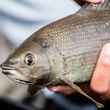
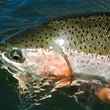
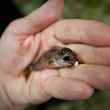
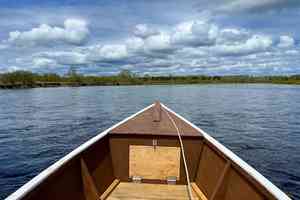



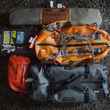
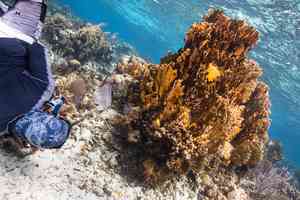


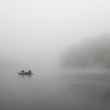
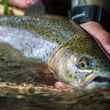



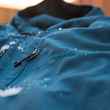
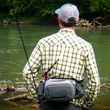





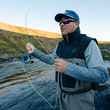
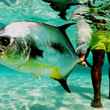

Comments